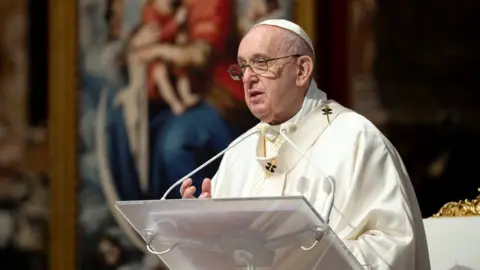Rethink: Pope Francis warns poor have become part of landscape
 Reuters
ReutersPope Francis says that the coronavirus pandemic has shown how much the poor are disconnected from society. Poverty is often hidden away, he says, but trying to help others can help us rediscover ourselves.

This coronavirus crisis is affecting us all, rich and poor alike, and putting a spotlight on hypocrisy. I am worried by the hypocrisy of certain political personalities who speak of facing up to the crisis, of the problem of hunger in the world, but who in the meantime manufacture weapons.
This is a time to be converted from this kind of functional hypocrisy. It's a time for integrity. Either we are coherent with our beliefs or we lose everything.
Every crisis contains both danger and opportunity. Today I believe we have to slow down our rate of production and consumption and to learn to understand and contemplate the natural world. We need to reconnect with our real surroundings. This is the opportunity for conversion.
I see early signs of an economy that is more human. But let us not lose our memory once all this is past, let us not file it away and go back to where we were. This is the time to take the decisive step, to move from using and misusing nature to contemplating it. We have lost the contemplative dimension; we have to get it back.
And speaking of contemplation, I'd like to dwell on one point.
This is the moment to see the poor. Jesus says we will have the poor with us always, and it's true. They are a reality we cannot deny. But the poor are hidden, because poverty is bashful.
In Rome recently, in the midst of the quarantine, a policeman said to a man: "You can't be on the street, go home." The response was: "I have no home. I live in the street."
There is such a large number of people who are on the margins. And we don't see them, because poverty is bashful. They have become part of the landscape; they are things.
Mother Teresa saw them and had the courage to embark on a journey of conversion. To "see" the poor means to restore their humanity. They are not things, not garbage; they are people.
We can't settle for a welfare policy such as we have for rescued animals. which is how the poor are often treated.
I'm going to dare to offer some advice. This is the time to go to the underground. I'm thinking of Dostoyevsky's short novel, Notes from Underground.
The employees of that prison hospital had become so inured they treated their poor prisoners like things. And seeing the way they treated one who had just died, the one on the bed alongside tells them: "Enough! He too had a mother!"
We need to tell ourselves this often: that poor person had a mother who raised him lovingly. Later in life we don't know what happened. But it helps to think of that love he once received through his mother's hope.
We disempower the poor. We don't give them the right to dream of their mothers. They don't know what affection is; many live on drugs. And to see them can help us to discover the piety, which points towards God and towards our neighbour.
Go down into the underground, and pass from the hyper-virtual, fleshless world to the suffering flesh of the poor. This is the conversion we have to undergo. And if we don't start there, then there will be no conversion.
The Pope's contribution has been provided by the Vatican and is part of a longer interview he gave to his biographer Austen Ivereigh.

BBC Radio 4, Radio 5 Live and World Service have come together for a unique collaboration: BBC Rethink. It asks how society and our lives can change for the better after the Covid-19 crisis.
You can hear the BBC Rethink episodes on BBC Sounds.
Read the other essays:
- Sleep scientist Matthew Walker on rest during lockdown
- Poet Caleb Femi on education
- Author Tara Westover on people coming together
- Writer Lucy Jones on why people are falling back in love with nature

